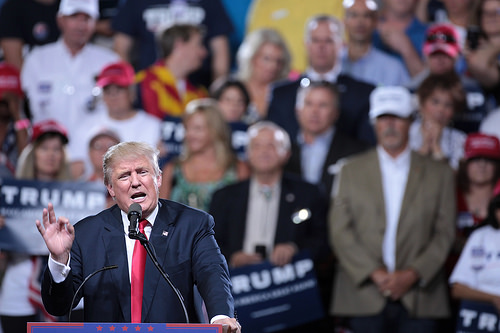BALTIMORE — Hillary Clinton may have been unwise to say half of Donald Trump’s supporters are racists and other “deplorables.” But she wasn’t wrong.
If anything, when it comes to Trump’s racist support, she might have low-balled the number.
Trump, speaking to the National Guard Association of the United States’ annual conference here Monday afternoon, proclaimed himself “deeply shocked and alarmed” about Clinton putting half of his supporters in the “basket of deplorables” — as if anybody, especially Trump, could be shocked by anything this late in the campaign. How dare she, Trump said, “attack, slander, smear, demean these wonderful, amazing people.”
But this isn’t a matter of gratuitous name-calling. This election has proved that there is much more racism in America than many believed. It came out of hiding in opposition to the first African-American president, and it has been welcomed into the open by Trump.
The American National Election Studies, the long-running, extensive poll of American voters, asked voters in 2012 a basic test of prejudice: to rank black and white people on a scale from hardworking to lazy and from intelligent to unintelligent. The researchers found that 62 percent of white people gave black people a lower score in at least one of the attributes. This was a jump in prejudicial attitudes from 2008, when 45 percent of white people expressed negative stereotypes.
This question is a good indicator of how one votes: Republican Mitt Romney won 61 percent of those who expressed negative stereotypes. And, when the question was asked during the 2008 primaries, those with negative racial stereotypes consistently favored Republican candidates — any of them — over any Democratic candidate in hypothetical matchups.
“There is plenty of overt white prejudice,” observes Simon Jackman, who directed the ANES until earlier this year and now runs the United States Studies Centre at the University of Sydney. “Whites who reported prejudicial beliefs about blacks skewed heavily Republican in 2008 and 2012 — and they will in 2016.”
Clinton’s infelicitous “basket of deplorables” phrase takes its place alongside Romney’s “binders full of women” in the awkward pantheon and could only have been devised by a woman who previously gave the world “ladders of opportunity.” But for the large number of racists drawn to Trump, the shoe fits.
In June, the Pew Research Center found that 79 percent of Clinton voters believe the treatment of racial and ethnic minorities is an important issue, while only 42 percent of Trump supporters feel that way. Earlier Pew research found that Trump supporters were significantly less likely than other Americans to think that racial and ethnic diversity improves the United States.
Research by Washington Post pollsters and by University of California at Irvine political scientist Michael Tesler, among others, have found that Trump does best among Americans who express racial animus. Evidence indicates fear that white people are losing ground was the single greatest predictor of support for Trump — more, even, than economic anxiety.
Few people embrace the “racist” label, so let’s help them. If you are “very enthusiastic” about a candidate who has based his campaign on scapegoating immigrants, Latinos and African-Americans, talked of banning Muslims from the country, hesitated to disown the Ku Klux Klan and employed anti-Semitic imagery — well, you might be a racist. But if you are holding your nose and supporting Trump only because you think him better than Clinton, that doesn’t put you in the basket.
The new Washington Post-ABC News poll finds the two groups roughly equal: Forty-six percent of Trump supporters say they are “very enthusiastic” about his candidacy. The rest were “somewhat” or not terribly enthusiastic.
There were mostly the latter at the National Guard gathering in Baltimore. Donny Crandell, a pastor from Nevada who serves as a National Guard chaplain, figured the audience was 70-30 for Trump, but with few of the “deplorables.” Said Crandell: “I don’t think you’ll find a lot of military types who are core Trump fans. They just like him better than her.” That includes Crandell, who backed Ted Cruz and would prefer Marco Rubio to Trump, whose “meanness” offends Crandell. “But he’s the choice we have,” the chaplain told me.
Trump, on stage, rejected any notion of racism, saying people who want secure borders “are not racists,” people who warn of “radical Islamic terrorism are not Islamophobes” and people who support police “are not prejudiced.” But moments later, he repeated the campaign slogan he borrowed from an anti-Semitic organization that opposed involvement in World War II.
“America First — remember that,” he said. “America First.”
That’s deplorable.
Follow Dana Milbank on Twitter, @Milbank.(c) 2016, Washington Post Writers Group
photo credit: Donald Trump via photopin (license)

















